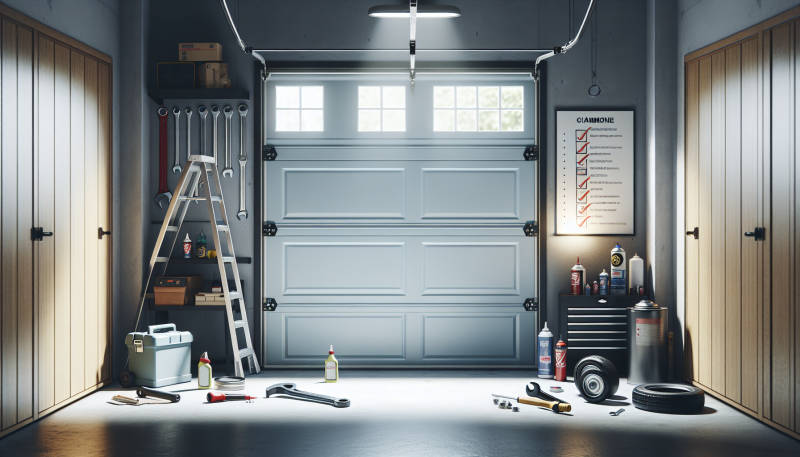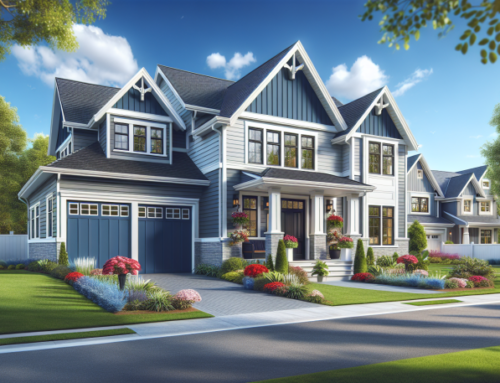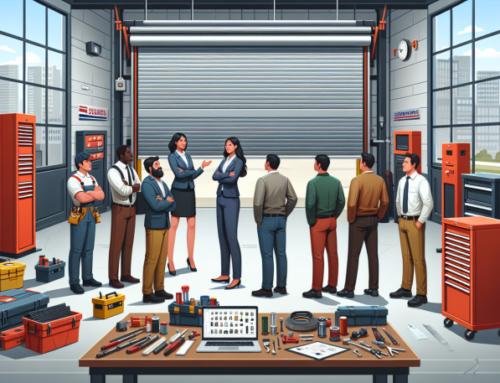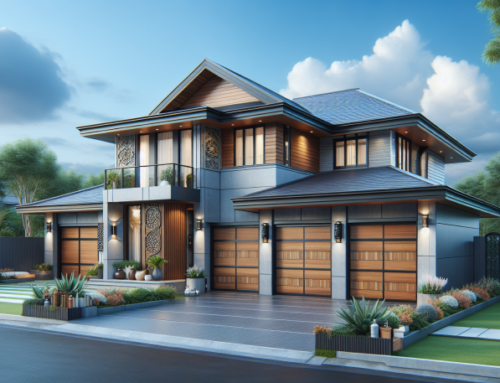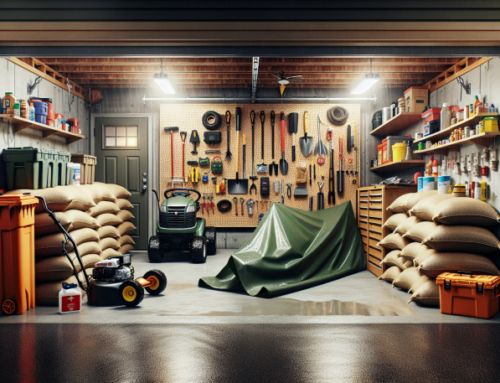When it comes to garage door maintenance, misinformation can lead to costly mistakes and unnecessary repairs. At Garage Door Pros, we understand the importance of keeping your garage door in top condition, especially in Pembroke Pines and the surrounding areas. Many homeowners fall victim to common myths that can hinder their maintenance efforts and compromise the safety and functionality of their garage doors. In this blog, we will debunk these myths and provide you with accurate information to ensure your garage door remains reliable and efficient. From understanding the importance of regular inspections to recognizing the signs of wear and tear, our expert insights will help you make informed decisions. Trust Garage Door Pros for swift and affordable garage door solutions, whether you need installation or repair services across Fort Lauderdale or beyond. Let’s set the record straight on garage door maintenance myths so you can keep your home safe and secure.
Common Misconceptions About Garage Door Lifespan
When it comes to garage doors, many homeowners harbor misconceptions about their lifespan, which can lead to misunderstandings about maintenance and replacement needs. One prevalent myth is that all garage doors are created equal in terms of durability and longevity. In reality, the lifespan of a garage door can vary significantly based on several factors, including the material, quality of installation, and maintenance practices. For instance, a well-maintained wooden door may last around 15 to 30 years, while a steel door can last up to 20 years or more.
Another common misconception is that garage doors do not require regular maintenance. Many people believe that as long as the door opens and closes without issues, there is no need for upkeep. However, neglecting routine maintenance can lead to premature wear and tear. According to the International Door Association, regular maintenance can extend the life of a garage door by up to 50%. Simple tasks such as lubricating moving parts, checking the balance, and inspecting the door for wear can make a significant difference in longevity.
Some homeowners also mistakenly think that the lifespan of a garage door is solely dependent on its material. While the material does play a role, factors such as weather conditions, frequency of use, and the quality of installation are equally important. For example, a high-quality fiberglass door may outperform a poorly installed steel door in terms of durability.
Another misconception is that garage doors are only at risk of damage from external impacts. While it is true that accidents can happen, many issues arise from internal components. For instance, worn-out springs or misaligned tracks can lead to operational failures, which may necessitate costly repairs or even a full replacement. Regular inspections can help identify these problems early, preventing more significant issues down the line.
Additionally, some believe that a garage door’s lifespan is fixed and cannot be influenced by the owner’s actions. In reality, proactive measures can significantly extend the life of a garage door. Homeowners can take steps such as keeping the door clean, ensuring that the sensors are functioning correctly, and addressing minor repairs promptly.
It is also a common myth that all garage doors will show signs of wear at the same time. In fact, different components may wear out at different rates. For instance, while the door itself may remain in good condition, the springs and cables may require replacement after a certain number of cycles. Understanding the specific components of a garage door and their expected lifespans can help homeowners plan for maintenance and repairs more effectively.
Moreover, many people believe that once a garage door reaches the end of its lifespan, it must be replaced entirely. However, in many cases, specific components can be repaired or replaced without the need for a full door replacement. This can save homeowners significant costs and extend the overall lifespan of the garage door system.
In conclusion, understanding the common misconceptions about garage door lifespan is crucial for effective maintenance and management. By recognizing the importance of regular maintenance, the role of various components, and the potential for repairs, homeowners can make informed decisions that enhance the longevity of their garage doors. For more information on maintaining your garage door, consider visiting our FAQ section or explore our blog for tips and insights. If you need professional assistance, our services are just a click away. Remember, a little proactive care can go a long way in ensuring your garage door serves you well for years to come.
The Truth Behind DIY Garage Door Repairs
When it comes to garage door maintenance, many homeowners often consider taking the DIY route for repairs. While the idea of fixing your garage door yourself can be appealing, it is essential to understand the potential risks and challenges involved. DIY garage door repairs can lead to more significant issues if not executed correctly, and in some cases, they can even pose safety hazards. One of the most common misconceptions is that all garage door problems can be easily fixed with a little bit of elbow grease and some online tutorials. However, this is far from the truth.
Garage doors are complex systems that consist of various components, including springs, cables, rollers, and tracks. Each of these parts plays a crucial role in the overall functionality of the door. For instance, garage door springs are under immense tension and can be dangerous to handle without proper knowledge and tools. Attempting to repair or replace these springs without professional assistance can result in serious injuries. It is advisable to leave such tasks to trained professionals who understand the intricacies of garage door systems.
Another common myth is that minor issues, such as a door that won’t open or close properly, can be resolved with simple adjustments. While some problems may seem straightforward, they can often be symptoms of more significant underlying issues. For example, a misaligned track might indicate that the door is off balance, which could lead to further complications if not addressed correctly. Instead of risking further damage or injury, it is wise to consult with experts who can accurately diagnose the problem and recommend appropriate solutions.
Moreover, many homeowners underestimate the importance of regular maintenance. While DIY repairs may seem like a cost-effective solution, neglecting routine upkeep can lead to more severe problems down the line. Regular maintenance checks can help identify potential issues before they escalate, saving you time and money in the long run. Professional services often include comprehensive inspections that cover all aspects of your garage door, ensuring that everything is functioning correctly.
In addition to safety concerns and the complexity of garage door systems, there is also the issue of warranties. Many garage doors come with warranties that may be voided if repairs are attempted by someone who is not a certified technician. This means that if you attempt a DIY repair and something goes wrong, you could end up facing significant repair costs without the benefit of warranty coverage. It is always best to check the warranty terms before deciding to take on repairs yourself.
If you are experiencing issues with your garage door, it is essential to weigh the pros and cons of DIY repairs versus hiring a professional. While DIY projects can be rewarding, garage doors require specialized knowledge and skills that most homeowners do not possess. For those who are unsure about their ability to perform repairs safely and effectively, seeking help from professionals is the best course of action.
In conclusion, while DIY garage door repairs may seem like an attractive option, the reality is that they can lead to more significant problems and safety risks. Understanding the complexities of garage door systems and the importance of professional maintenance can help you make informed decisions about your garage door care. If you are facing issues with your garage door, consider reaching out to experts who can provide reliable and safe repair services. For more information on garage door services, you can visit our service page or learn more about our company. If you have specific questions, feel free to check our FAQ section for more insights.
Understanding the Importance of Regular Maintenance
Regular maintenance of your garage door is crucial for ensuring its longevity, safety, and functionality. Many homeowners underestimate the importance of this routine upkeep, often leading to costly repairs and potential safety hazards. A garage door is not just an entry point; it plays a significant role in the security of your home and the protection of your vehicles and belongings. By understanding the importance of regular maintenance, you can avoid common pitfalls and myths that may lead to neglect.
One of the primary reasons to prioritize garage door maintenance is to enhance safety. A malfunctioning garage door can pose serious risks, including accidents or injuries. Regular inspections can help identify issues such as worn-out springs, misaligned tracks, or faulty sensors that could lead to dangerous situations. By addressing these problems early, you can ensure that your garage door operates smoothly and safely, protecting your family and property.
Moreover, routine maintenance can significantly extend the lifespan of your garage door. Just like any other mechanical system, garage doors require care to function optimally. Regular lubrication of moving parts, tightening of hardware, and checking for wear and tear can prevent premature breakdowns. This proactive approach not only saves you money in the long run but also ensures that your garage door remains a reliable part of your home.
Another critical aspect of garage door maintenance is its impact on energy efficiency. A well-maintained garage door can help regulate the temperature in your garage, which can, in turn, affect the overall energy efficiency of your home. If your garage door is not sealing properly, it can lead to drafts and increased energy costs. Regular maintenance, including checking seals and insulation, can help maintain a comfortable environment and reduce energy bills.
Additionally, regular maintenance can enhance the aesthetic appeal of your home. A well-maintained garage door contributes to the overall curb appeal of your property. This is particularly important if you are considering selling your home, as potential buyers often notice the condition of the garage door. Keeping your garage door in top shape can make a positive impression and potentially increase your home’s value.
It is also essential to recognize that many common myths about garage door maintenance can lead to neglect. For instance, some homeowners believe that as long as the door opens and closes, it does not require attention. This misconception can lead to significant issues down the line. Regular maintenance is not just about ensuring the door functions; it is about preventing problems before they arise.
For those who may not feel comfortable performing maintenance tasks themselves, professional services are available. Hiring experts for routine inspections and repairs can provide peace of mind. Professionals can spot potential issues that may go unnoticed by an untrained eye. If you are looking for reliable garage door services, consider reaching out to garage door repair experts who can assist with maintenance and repairs tailored to your needs.
In conclusion, understanding the importance of regular garage door maintenance is vital for every homeowner. It ensures safety, extends the lifespan of your door, improves energy efficiency, and enhances the aesthetic appeal of your property. By dispelling common myths and committing to a maintenance routine, you can protect your investment and enjoy the peace of mind that comes with a well-functioning garage door. For more information on garage door services or to schedule a maintenance check, feel free to contact us today. Remember, a little maintenance goes a long way in preserving the functionality and safety of your garage door.
Myths About Garage Door Noises and Their Causes
Garage doors are essential components of our homes, providing security and convenience. However, they can also be a source of confusion, especially when it comes to the noises they make. Many homeowners have misconceptions about these sounds, leading to unnecessary worry or misinformed decisions regarding maintenance and repairs. Understanding the myths surrounding garage door noises can help you better assess the condition of your garage door and determine when professional help is needed.
One common myth is that all garage door noises indicate a serious problem. While it is true that some sounds can signal an issue, not all noises are cause for alarm. For instance, a garage door may creak or groan as it opens and closes due to the natural movement of its components. This is often a result of the door’s weight and the friction between moving parts. Regular maintenance, such as lubrication of hinges and rollers, can significantly reduce these sounds, making them less concerning.
Another prevalent myth is that a loud garage door means it is on the verge of breaking down. While excessive noise can indicate wear and tear, it does not always mean that the door is about to fail. Many garage doors can operate for years with some noise without experiencing a complete breakdown. However, if the noise is accompanied by other symptoms, such as the door not opening or closing properly, it may be time to investigate further. In such cases, consulting with garage door repair experts can provide clarity on the situation.
Some homeowners believe that all garage door noises are related to the springs. While the springs are crucial components that can indeed produce noise when they are worn or damaged, other parts of the garage door system can also contribute to sounds. For example, the opener mechanism, tracks, and rollers can all create noise if they are misaligned or in need of lubrication. Therefore, it is essential to consider the entire system rather than focusing solely on the springs when diagnosing noise issues.
Another myth is that garage doors should be completely silent when in operation. In reality, some noise is normal due to the mechanical nature of the system. A well-maintained garage door will produce minimal noise, but complete silence is unrealistic. If your garage door is excessively loud, it may indicate that it requires maintenance or repair. Regular inspections and tune-ups can help keep your garage door functioning smoothly and quietly.
Many people also believe that they can fix any noise-related issue themselves. While some minor adjustments can be made by homeowners, such as lubricating parts or tightening screws, more complex problems often require professional intervention. Attempting to fix significant issues without the proper knowledge can lead to further damage or even injury. It is advisable to contact a professional service for comprehensive repairs, especially if you suspect a problem with the door’s springs or opener.
Lastly, there is a myth that garage door noises are always a sign of aging. While it is true that older doors may be noisier due to wear and tear, newer models can also produce sounds if not properly maintained. Regular maintenance is crucial for all garage doors, regardless of their age. Ensuring that your garage door is well-lubricated, aligned, and free of debris can help minimize noise and extend its lifespan.
In conclusion, understanding the myths surrounding garage door noises is essential for effective maintenance and repair. Not all noises indicate a serious problem, and many can be resolved with simple maintenance. However, if you encounter persistent or unusual sounds, it is wise to consult with professionals who specialize in garage door services. By debunking these myths, homeowners can make informed decisions about their garage doors, ensuring they remain safe and functional for years to come. For more information on garage door maintenance and repair, visit our blog for tips and insights.
Debunking the Belief That All Garage Doors Are the Same
Many homeowners fall into the misconception that all garage doors are essentially the same, but this belief could not be further from the truth. In reality, garage doors come in a variety of styles, materials, and mechanisms, each designed to meet different needs and preferences. Understanding these differences is crucial for effective garage door maintenance and ensuring the longevity of your investment.
First and foremost, garage doors can be categorized into several types, including sectional, roll-up, tilt-up, and side-hinged doors. Each type operates differently and has unique maintenance requirements. For instance, sectional doors, which are the most common, consist of several panels that slide up and down on tracks. They require regular lubrication of the tracks and hinges to ensure smooth operation. On the other hand, roll-up doors, often used in commercial settings, may need different maintenance practices due to their design and usage frequency.
The materials used in garage doors also vary significantly. Common materials include wood, steel, aluminum, and fiberglass. Each material has its own set of advantages and disadvantages. Wooden doors, while aesthetically pleasing, require more maintenance to prevent rot and warping. Steel doors are durable and low-maintenance but can be prone to rust if not properly treated. Aluminum doors are lightweight and resistant to corrosion, making them ideal for coastal areas, while fiberglass doors offer excellent insulation but can be more expensive. Understanding the material of your garage door is essential for knowing how to care for it properly.
Another critical aspect to consider is the insulation of garage doors. Insulated doors are designed to maintain temperature and reduce energy costs, making them a popular choice for homeowners. However, not all garage doors are insulated, and those that are may use different insulation methods, such as polystyrene or polyurethane. The type of insulation affects not only energy efficiency but also the door’s overall durability and maintenance needs.
Moreover, the operating mechanism of garage doors can vary. Some doors are manually operated, while others are equipped with automatic openers. Automatic garage doors require additional maintenance, including checking the opener’s functionality, ensuring the safety sensors are working, and keeping the remote controls in good condition. Neglecting these components can lead to malfunctioning doors, which can be both inconvenient and costly to repair.
Additionally, the climate in which you live can influence the type of garage door that is best suited for your home. In areas with extreme temperatures, a well-insulated door can help regulate the garage’s temperature, protecting your vehicle and stored items. In contrast, regions with high humidity may require doors that resist moisture damage. Understanding your local climate can guide you in selecting the right door and maintaining it effectively.
Lastly, it is essential to recognize that the belief that all garage doors are the same can lead to inadequate maintenance practices. Homeowners may overlook specific care requirements unique to their garage door type, material, and operating mechanism. This oversight can result in premature wear and tear, leading to costly repairs or even the need for a complete replacement. Regular maintenance tailored to your specific garage door is vital for ensuring its functionality and extending its lifespan.
In conclusion, the notion that all garage doors are the same is a myth that can have significant implications for homeowners. By understanding the various types, materials, insulation options, and operating mechanisms of garage doors, you can make informed decisions about maintenance and repairs. For more information on different types of garage doors, you can visit our types of garage doors page. If you have questions about your specific garage door needs, feel free to check our FAQ section or contact us for expert advice. Understanding the unique characteristics of your garage door will not only enhance its performance but also ensure that it serves you well for years to come.
The Reality of Garage Door Safety Features
When it comes to garage doors, safety features are often overlooked, yet they play a crucial role in ensuring the well-being of your family and property. Many homeowners may not fully understand the importance of these features, leading to misconceptions about their effectiveness and necessity. One of the most significant safety features in modern garage doors is the automatic reversal system. This system is designed to prevent accidents by reversing the door’s direction if it detects an obstruction while closing. This feature is particularly vital for households with children or pets, as it helps to avoid potentially dangerous situations.
Another essential safety component is the photoelectric sensor. These sensors are installed near the bottom of the garage door and work by projecting an invisible beam across the door’s path. If the beam is interrupted by an object, the door will stop and reverse, ensuring that nothing gets caught underneath. Regular maintenance of these sensors is crucial, as dirt or misalignment can hinder their functionality. Homeowners should routinely check and clean these sensors to ensure they are working correctly.
Additionally, many garage doors come equipped with a manual release mechanism. This feature allows you to disengage the door from the opener in case of a power outage or malfunction. Understanding how to use this mechanism is essential for every homeowner, as it can provide a quick solution during emergencies. However, it is equally important to ensure that the manual release is functioning properly and is easily accessible.
While these safety features are designed to protect, they are not foolproof. Regular maintenance is necessary to ensure that all components are in good working order. This includes inspecting the springs, cables, and tracks for wear and tear. Neglecting these parts can lead to malfunctions that compromise safety. For instance, worn-out springs can cause the door to fall unexpectedly, posing a significant risk to anyone nearby. Homeowners should consider scheduling routine inspections with professionals who specialize in garage door services to address any potential issues before they become serious problems.
Moreover, it is essential to understand that safety features can vary significantly between different types of garage doors. For example, sectional doors may have different safety mechanisms compared to roller doors. Homeowners should familiarize themselves with the specific safety features of their garage door type to ensure they are adequately protected. If you are considering a new installation, it is advisable to consult with experts who can guide you on the best options available, including various types of garage doors that come with advanced safety features.
In addition to mechanical safety features, it is also important to consider the role of technology in enhancing garage door safety. Smart garage door openers can provide additional layers of security, such as remote monitoring and alerts when the door is opened or closed. These systems can be integrated with home security systems, allowing homeowners to keep an eye on their garage door from anywhere. However, it is crucial to ensure that these smart systems are installed correctly and updated regularly to protect against potential cyber threats.
In conclusion, the reality of garage door safety features is that they are vital for protecting your home and loved ones. Understanding how these features work and maintaining them properly can significantly reduce the risk of accidents. Homeowners should not only rely on the built-in safety mechanisms but also take proactive steps to ensure their garage door is in optimal condition. Regular maintenance, professional inspections, and staying informed about the latest safety technologies are essential practices for any responsible homeowner. For more information on maintaining your garage door and ensuring its safety, feel free to visit our FAQ section or contact our team for expert advice.
Misunderstandings About Weatherproofing and Insulation
When it comes to garage door maintenance, many homeowners harbor misconceptions about weatherproofing and insulation that can lead to costly mistakes and inefficiencies. One common misunderstanding is that weatherproofing is only necessary in extreme climates. In reality, regardless of your local weather conditions, proper weatherproofing can significantly enhance the energy efficiency of your garage. A well-sealed garage door prevents drafts, moisture, and pests from entering, which can protect your belongings and improve the overall comfort of your home.
Another prevalent myth is that insulation is only important for garages that are used as living spaces. While it is true that insulated garage doors are crucial for maintaining comfortable temperatures in converted garages, they also play a vital role in protecting your vehicle and tools from temperature extremes. Insulation helps to regulate the temperature inside the garage, preventing the cold from affecting your car’s battery and fluids during winter months, and keeping tools from rusting due to humidity.
Many people also believe that all garage doors come with adequate insulation. This is not the case. Garage doors vary widely in their insulation properties, and many standard doors offer little to no insulation. Homeowners should consider investing in high-quality insulated garage doors, especially if they live in areas with fluctuating temperatures. This investment not only enhances comfort but can also lead to lower energy bills, as a well-insulated garage can help maintain the temperature of adjacent living spaces.
Another misconception is that weatherproofing and insulation are one-time tasks. In reality, these elements require regular maintenance and occasional upgrades. Weather stripping can wear out over time, and insulation can become less effective due to wear and tear or damage. Homeowners should routinely check the seals around their garage doors and replace any worn-out weather stripping to ensure optimal performance. Additionally, if you notice significant temperature changes in your garage, it may be time to reassess your insulation and consider upgrading to a more energy-efficient option.
Some homeowners mistakenly believe that weatherproofing and insulation are too expensive or complicated to implement. However, many affordable options are available, and the long-term savings on energy costs can far outweigh the initial investment. Simple DIY projects, such as adding weather stripping or using insulation kits, can be effective and budget-friendly solutions. For those who prefer professional assistance, hiring experts can ensure that the job is done correctly and efficiently.
Lastly, there is a belief that if a garage door looks fine from the outside, it does not need weatherproofing or insulation. This is misleading, as many issues can be hidden from view. For instance, gaps or cracks may not be immediately visible but can significantly impact the garage’s energy efficiency. Regular inspections by professionals can help identify these hidden problems and ensure that your garage door is functioning optimally.
In conclusion, understanding the realities of weatherproofing and insulation is crucial for effective garage door maintenance. By dispelling these myths, homeowners can make informed decisions that enhance their garage’s functionality and energy efficiency. For more information on garage door maintenance and to explore our range of services, visit our services page. If you have questions or need assistance, feel free to contact us for expert advice and support.
In conclusion, understanding the truth behind common garage door maintenance myths is essential for every homeowner. By debunking these misconceptions, you can ensure that your garage door remains in optimal condition, enhancing both its longevity and functionality. Regular maintenance, performed with accurate knowledge, not only prevents costly repairs but also ensures the safety and security of your home. Remember, when it comes to garage door care, it’s always best to rely on facts rather than myths. So, the next time you hear a claim about garage door maintenance, take a moment to evaluate its validity. Armed with the right information, you can confidently tackle any maintenance tasks and enjoy the peace of mind that comes with a well-maintained garage door. Happy maintaining!


